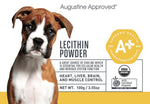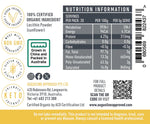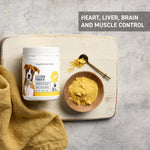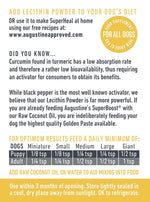Augustine Approved Lecithin Powder (100% certified organic) 100g / 3.55oz
HEART, LIVER, BRAIN AND MUSCLE CONTROL
- Omega 3s & 6s
- Helps Lower Cholesterol
- Healthy Liver Function
- Cardiovascular Health
- Cognitive Function
- Promotes Healthy Weight Loss
DID YOU KNOW...
Curcumin found in turmeric has a low absorption rate and therefore a rather low bioavailability, thus requiring an activator for consumers to obtain its benefits. While black pepper is the most well known activator, we believe that our Lecithin Powder is far more powerful. If you are already feeding Augustine’s SuperBoost® with our Raw Coconut Oil, you are indeliberately feeding your dog the highest quality Golden Paste available.
What is it?
Lecithin is a fat, namely a phospholipid and is found in every cell in the body. If phospholipids are not present in sufficient amounts to maintain the cell membrane structure, the membrane loses its ability to protect and nourish the cell. Phospholipids (commonly referred to as lecithin) are natural compounds found in plant and animal tissue. Phospholipids, in simplistic terms, are composed of fatty acids (linoleic (omega-6), oleic, palmitic, linolenic (omega-3) and others), phosphorus, choline (a B-vitamin) and other lesser compounds. Phospholipids are essential components of cell membranes, are synthesized in the body, and are the most abundant lipid component in animal cell membranes. Adding additional lecithin to human diets, as well as animal diets, is proving to be very beneficial as its value as a “functional food” is being discovered.
Fat has become one of the dirtiest words in the English language with good reason. The accumulation of excess fat can pose a serious threat to both mental and physical health. Ironically, we and dogs need fat in our diets and must have it daily so it is important to consume good quality fat. Dogs get most of their energy from fat.
Although lecithin can be found in egg yolks, corn, and soybeans, our sunflower lecithin is the most nutrient dense and beneficial we could source worldwide.
Lecithin aids in maintaining our overall health and is utilised by every cell in the bodies. Of its many benefits, lecithin has been proven to decrease cholesterol, promote cardiovascular health, restore damaged livers and improve the brain's memory function.
One way lecithin aids in preventing or reversing certain diseases and conditions is that since it is predominately comprised of fat itself, it adheres to our cell and nerve linings, forming a sheath, and prevents cholesterol and other fats from sticking. By doing this, in the case of patients with high cholesterol, it decreases the body's ability to absorb cholesterol across the intestinal wall, thus lowering total cholesterol.
Lecithin intervenes with the body's ability to form fat deposits and has aided in reversing the damage caused by coronary artery disease. By creating a slippery lining, it prevents large fat deposits from accumulating, allowing the blood to flow more smoothly when it once was clogged with fat deposits that would lead to blood clots. When it breaks down the body fat, not only does it prevent the fat from collecting in large deposits in the body, it then transports it to the liver and converts it into usable energy.
Lecithin is also known to repair livers in people that have been damaged by abuse such as too much alcohol consumption.
Enriching dog diets with lecithin can result in better-looking dogs, mentally sharper dogs and dogs that perform at a higher level. Dogs receiving additional lecithin are known to have a healthier coat and better skin condition compared to that of dogs not receiving lecithin. Research has demonstrated that supplementing dog foods with 1% to 3% lecithin provides the phospholipids and essential fatty acids needed to maintain membrane fluidity, permeability and integrity as well as the synthesis of some other metabolically active compounds. Dogs with healthy skin are more resistant to irritations, infections, allergens, and scrapes, and cuts heal more quickly. Likewise, their coat has the sheen and lustre that just radiates “healthy dog.”
Cell membranes throughout the body are affected by greater lecithin consumption. The impact on skin and hair is visually apparent; however, virtually all cells return to “normal” when a more optimal level of lecithin is consumed. The synthesis of certain metabolically active compounds returns to normal, permitting more normal overall metabolic function and put simply, “Things just work better!”. Dogs maintain their appetite and keep better condition during heavy training and working; not only do they look better, but they also respond and perform better physically.
Choline, a component of the phospholipid phosphatidylcholine, is a B-vitamin. Choline has long been known as a component of acetylcholine - the chemical compound essential for nerve impulse transmission. Also, choline, when supplied in sufficient amounts, “spares” methionine, a dietary essential amino acid needed for protein synthesis. By sparing methionine, choline indirectly aids in normal protein synthesis.
New research shows that choline (from lecithin) probably is essential for normal brain development. Research at Duke University indicates that offspring from bitches fed diets supplemented with lecithin during gestation and lactation were, in effect, “smarter” than offspring from bitches fed un-supplemented diets. Brain development studies with rats tend to support the findings of the Duke researchers. These researchers found that in laboratory rats, choline supplementation is critical during certain periods in gestation and lactation. Actually, supplementation during days 12-17 (embryonic) and days 16-30 (postnatal) is critical in rat brain development. These time periods coincide with cholinergic neuron (neurons requiring acetylcholine) formation (prenatal) and nerve-nerve connections (postnatal) in the memory area of the brain. Similar critical periods for choline (lecithin) supplementation may also exist in dogs.
Trainers report that dogs fed lecithin containing supplements for several weeks before starting training are easier to train, learn more quickly, and “know what is going on” better than dogs not fed lecithin until they arrive at the kennel for training. These trainers also recognize that dogs getting lecithin-based products are in better condition and have more stamina than un-supplemented dogs.








